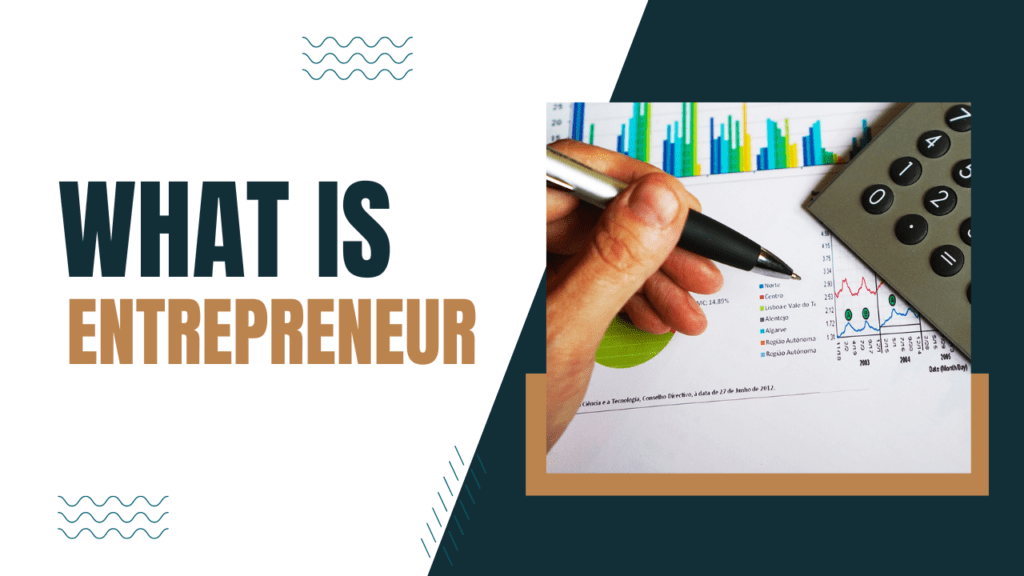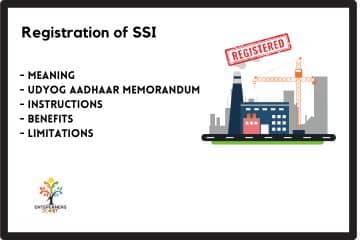The term “What is mean by Entrepreneur” refers to the concept of understanding the definition and essence of an entrepreneur. Could you please explain the definition of an entrepreneur? DONT WORRY. I clarify the concept of an entrepreneur.

Human beings satisfy their needs and wants by consuming goods and services To produce goods and services, some input factors are required. The major input factors are land, labor, capital, etc. However, the mere presence of these input factors does not lead to the production of goods or services.
Suppose, the land is lying in one place; labor is lying in another place; and capital is in some other place. In this scenario, production will never occur. Production shall take place only if the land, labor, and capital are brought together.
The process of bringing together the various factors of production is known as organization. The process of organization is very complicated. This involves risk and uncertainty. In this situation, who will come forward to undertake risk and bear uncertainty?
The majority of the people are reluctant to undertake the risk and uncertainty involved in organizing the factors of production. Only a select few individuals are willing and capable of taking on risks and uncertainties. These people are not mere dreamers. They are doers as well. They create wealth. They create employment.
They work hard to achieve success. As a result, they hold a distinct position in society. They become an entrepreneur.
Contents
What is mean by Entrepreneur (Meaning and Definition)
The term entrepreneur originates from the French word (verb) entreprendre. It means to “undertake“. Thus, the entrepreneur is the person who undertakes the risk of the new business.
In the early sixteenth century, the Frenchmen who organized and led military expeditions were referred to as entrepreneurs; The term entrepreneur was applied to business in the early eighteenth century by French Economist, Richard Cantillon.
Entrepreneur Definition
According to French Economist, Richard Cantillon an entrepreneur “is a person who buys factor services at certain prices to sell them at uncertain prices in the future“. He emphasized the function of risk-taking and uncertainty-bearing (1725).
Richard Cantillon
Generally, anyone who runs a business is called an entrepreneur. An entrepreneur is ordinarily called a businessman. He is a person who combines capital and labor for production. They are responsible for organizing and managing a business entity while assuming the risk in pursuit of profit. Thus, the entrepreneur is a person who creates an enterprise.
BBC English Dictionary gives a simple definition of an entrepreneur. According to it,” an entrepreneur is a person who sets up a business“.
BBC English Dictionary
The Webster’s Dictionary defines an entrepreneur as “one who organizes manages and assumes the risks of a business or enterprise“
The New Encyclopaedia Britannica defines an entrepreneur as ” an individual who bears the risk of operating a business in the face of uncertainty about the future conditions“
The New Encyclopaedia Britannica
In the words of J.B. Say, “To put it simply, an entrepreneur is someone who brings together the factors of production and combines them to create a product.“. In his view, the entrepreneur didn’t need to bring his capital. He emphasized the difference between a capitalist and an entrepreneur. The capitalist is only a financier. An entrepreneur is the co-ordinator and organizer of a business enterprise.
J.B. Say
According to the International Labour Organization (ILO), “entrepreneurs are individuals who possess the ability to identify and evaluate business opportunities, gather the necessary resources to capitalize on them, and take appropriate action.“.
International Labour Organization (ILO)
Joseph A Schumpeter defines “an entrepreneur as someone who innovates raises funds, assembles inputs, and establishes an organization by utilizing their ability to identify and seize economic opportunities that others cannot fulfill. He further states that an “entrepreneur is an innovative individual who contributes to the material growth of economic development“.
Joseph A Schumpeter
Thus, different writers have defined entrepreneurs in different ways. Cantillon emphasized the function of risk-taking and uncertainty-bearing. Say and Marshall stressed the aspect of coordination and organization. Schumpeter emphasized innovation as the function of the entrepreneur.
Leon Walras considered the entrepreneur as “the fourth factor of production apart from land, labor, and capital.” Generally, there is no accepted definition or model of what the entrepreneur is or does.
Leon Walras
To conclude, an entrepreneur is a person who creates, develops, and manages a business enterprise. In short, an entrepreneur starts and operates his own business. He is sometimes called an entrepreneur.
Characteristics of an Entrepreneur

An entrepreneur is a hero of market place. He is not merely a simple owner of capital. He is a business leader. He has the following characteristics:
- An entrepreneur brings about change (the catchword of the 21st century) in society. He is a catalyst of change.
- Entrepreneur improves technology, products, and society.
- An entrepreneur is a driven and ambitious individual who actively pursues their goals by taking calculated risks.
- Entrepreneurs are creative and result-oriented. They dedicate themselves to hard work, aiming to reap both personal and financial benefits in return.
- Entrepreneur accepts responsibilities with enthusiasm and endurance.
- An entrepreneur is both a thinker and doer, planner and worker.
- The entrepreneur always looks for opportunities and exploits them for economic gains. He shows an innovative turn of mind and converts difficulties into opportunities. He recognizes opportunities where others see chaos and confusion.
- Entrepreneur undertakes new business venture not for their gain alone but for the benefit of consumers, government, and society as well.
- Entrepreneur builds new enterprises. He possesses an intense level of determination and a desire to overcome hurdles solve problems and complete the job.
- The entrepreneur has a tremendous amount of personal energy and drive. He possesses the capacity to work for long hours and for several days with less than a normal amount of sleep.
- Entrepreneurs find the resources required to exploit opportunities.
- Entrepreneurs embark on their own ventures due to their aversion to working for others. They prefer to be their boss and want to be responsible for their own decisions.
- Entrepreneurs create capital. Apart from intellectual and emotional capital (innovation, creativity, resource acquisition, etc.), he also creates external capital such as financial capital, social capital, and aesthetic capital.
- They possess a unique ability to envision, work diligently, and exhibit unwavering passion. He challenges assumptions and breaks rules.
- A clever entrepreneur does not take high risks. He is not a gambler. These individuals prefer to take calculated risks, ensuring that they do not jeopardize their endeavors. He tries to reduce risk and increase the chances of success. Thus, it is very difficult to paint a clear picture of the entrepreneurial personality.
Classification of Entrepreneurs (Different Types of Entrepreneurs)

There exist various categories of entrepreneurs, each with their distinct characteristics.
Based on the type of business:

Based on this information, entrepreneurs are categorized into various classifications. They are:
- Business entrepreneur: who conceives an idea and subsequently establishes a business to bring that idea to fruition..
- Trading entrepreneur: He is an entrepreneur who undertakes trading activity, i.e., buying and selling manufactured goods. He does not undertake manufacturing activities.
- Industrial entrepreneur: engages in manufacturing activities, showcasing their prowess in this field
- Corporate entrepreneur: showcases their innovative skills in organizing and managing corporate ventures.
- Agricultural entrepreneurs: They are entrepreneurs who undertake agricultural activities such as raising and marketing of crops, fertilizers, and other inputs of agriculture. They are called agripreneurs.
Based on Motivation:

In light of these classifications, it is evident that entrepreneurs can be categorized into different types.
- Pure entrepreneur: Pure entrepreneurs are individuals driven by both psychological and economic incentives. They embark on business endeavors to attain personal fulfillment, social standing, and self-importance. Their primary motivation lies in the pursuit of financial gain. They apply their business skills to earn more and more profit.
- Induced entrepreneur: He is an entrepreneur who is induced to take up an entrepreneurial activity to avail some benefits from the government. The benefits are in the form of assistance, incentives, subsidies, concessions, and infrastructure.
- Motivated entrepreneur: Motivated entrepreneurs are driven by their aspiration to utilize their technical and professional expertise and abilities. They are motivated by the desire for self-fulfillment. They are highly ambitious.
- Spontaneous entrepreneurs: They are entrepreneurs with initiative, boldness, and confidence in their ability. This motivates them to undertake entrepreneurial activities. They start their business out of their natural talents.
Based on Stages of Development:
Based on stages of development entrepreneurs may be classified into:
- First-generation entrepreneur: He starts an industrial unit using his innovative ideas and skills. He is essentially an innovator. He utilizes technology to create a product or service. He has no entrepreneurial background. He is also called a new entrepreneur.
- Modern entrepreneur: He is an entrepreneur who undertakes ventures that suit modern marketing needs.
- Classical entrepreneur: He develops a self-supporting venture for the satisfaction of customers’ needs. He does not undertake any innovation. He is a stereotypical or traditional entrepreneur. He is also called lifetime.
Classification by Clarence Danhof:
Clarence Danhof, based on his study of American agriculture, classified entrepreneurs into the following categories:
- Innovative entrepreneurs: These type of entrepreneurs are very innovative. They show a high tendency to undertake risks. They are generally aggressive in experimentation and cleverly put attractive possibilities into practice. An innovative entrepreneur introduces new goods, inaugurates new methods of production, discovers new markets, and reorganizes the enterprise. Schumpeter’s entrepreneur was of this type. Innovative entrepreneurs bring about a transformation in lifestyle. In short, innovative entrepreneurs are always interested in introducing innovations. Innovative entrepreneurs are commonly found in developed countries.
- Adoptive or Imitative entrepreneurs: These entrepreneurs adopt successful innovation created by innovative entrepreneurs. Imitative entrepreneurs do not innovate the changes themselves; they only imitate techniques and technology innovated by others. They copy and learn from the innovating entrepreneurs. While innovating entrepreneurs are creative, imitative entrepreneurs are adoptive. Imitative entrepreneurs are most suitable for underdeveloped countries because in these countries people prefer to imitate technology, knowledge, and skills already available in the developed countries. In highly backward countries there is a shortage of even imitative entrepreneurs.
- Fabian entrepreneurs: These entrepreneurs are traditional. They would be cautious. They neither introduce new changes nor adopt new methods innovated by other entrepreneurs. They are shy and lazy. They are not much interested in risks. They try to follow in the footsteps of their predecessors. They follow old customs, traditions, sentiments, etc. They change only when there is a threat to the very existence of business.
- Drone entrepreneurs: Drone entrepreneurs are those who refuse to adopt and use opportunities to make changes in production. They would not change the method of production already introduced. They follow the traditional methods of production. They may even suffer losses but they are not ready to make changes in their existing production methods. When their product loses marketability and their operations become uneconomical they are thrown out of the market. They are conventional because they stick to conventional products and ideas. They are not prepared to take risks. They are Laggards. They are called laggards because they continue to operate in their traditional way and resist changes.
There is another classification of entrepreneurs. According to this, entrepreneurs may be broadly classified into commercial entrepreneurs and social entrepreneurs.
- Commercial entrepreneurs: Commercial entrepreneurs are those entrepreneurs who start business enterprises for their own gain. They undertake business ventures to generate sales and profits. Most of the entrepreneurs belong to this category.
- Social entrepreneurs: are those who identify, evaluate, and exploit opportunities that create social value and not personal wealth. s focus on the disadvantaged sections of the society. They play the role of change agents in the society. In short, social entrepreneurs are those who start ventures not to make a profit but to provide social welfare. An example of a social entrepreneur is Muhammad Yunus (an economist from Bangladesh). He was awarded the Nobel Prize for Peace, (in 2006) for the organization he started, Grameen Bank (started in 1976). It specializes in providing small (micro) loans to poor entrepreneurs in Bangladesh.





[…] Check out: What is meant by Entrepreneur […]
[…] I also made a detailed article about What is Entrepreneur and its definition. you check here 👉 What is mean by Entrepreneur (Meaning and Definition) 2024 […]
[…] of a nation may be studied under the taking after heads: Before taking to the next step check out What is Entrepreneur and what is its […]
[…] (EDPs) aim at the comprehensive development of trainees as entrepreneurs. Development of an entrepreneur means inculcating entrepreneur traits into a person, imparting the required knowledge, and developing the […]
I know a lot of folks whom I think would really enjoy your content that covers in depth. I just hope you wouldn’t mind if I share your blog to our community.